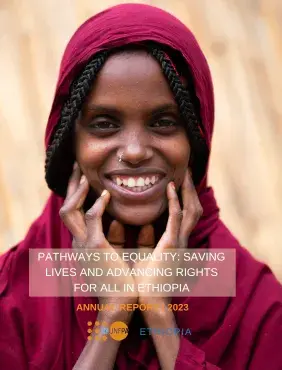Despite the myriad challenges faced in 2023 in the form of conflicts, insecurity, and natural disasters, UNFPA in Ethiopia has made remarkable strides. Through robust cooperation with the Government of the Federal Democratic Republic of Ethiopia and subnational administrations within the country as well as collaborative partnerships with donors, civil society organizations, and communities, UNFPA has focused its efforts on promoting reproductive health and rights for women and girls, as well as empowering young people.
Aligned with UNFPA's global ambition of achieving ‘four zeros' – namely, ending unmet need for family planning, ending maternal deaths, and ending gender-based violence and harmful practices against women and girls, and ending HIV transmission – our work in Ethiopia remains crucial. UNFPA's programmes in reproductive health, gender equality, youth empowerment, and population and data are implemented in both development and humanitarian settings, making a tangible difference in the lives of those we strive to reach.
Ethiopia still grapples with challenges such as high maternal mortality and limited access to reproductive health services. UNFPA's support has been instrumental in providing vital services in hard-to-reach areas, ensuring safe deliveries through supporting initiatives such as Maternity Waiting Homes (MHWs), Mobile Health and Nutrition Teams (MHNTs), strengthening referral systems, building the capacity of health workers, and availing quality-assured reproductive health (SRH) commodities at service delivery points. The support on strengthening the supply chain and regulatory systems has also been instrumental.
As the lead United Nations agency in the prevention of and response to Gender-Based Violence (GBV), UNFPA has provided critical support to thousands of survivors in Ethiopia. Through medical services, advocacy, psychosocial counseling, legal assistance, capacity building, awareness raising, and livelihood support, UNFPA has established mechanisms to effectively prevent and respond to the needs of GBV survivors.
UNFPA, in its role as the pipeline manager for lifesaving interagency reproductive health kits in the health cluster system and co-chair of the Sexual and Reproductive Health (SRH) working group, has been instrumental in coordinating and implementing the Minimum Initial Service Package (MISP) for SRH during crisis situations. This package comprises critical, life-saving interventions aimed at addressing the SRH needs of affected populations right at the onset of humanitarian crises. These needs are often overlooked, but their consequences can be life-threatening.
Youth empowerment remains a top priority for UNFPA in Ethiopia. Recognizing that Ethiopia has a youthful population, investing in the youth is crucial for achieving the SDGs. UNFPA's support for initiatives such as strengthening more than 102 youth serving platforms and functional mechanisms to enhance youth engagement and participation, in matters affecting their lives and paving the way for sustainable development.
This annual report offers a glimpse into the achievements of UNFPA and its partners in Ethiopia, with the generous support of various donors. We extend our heartfelt gratitude to all our partners and stakeholders for their unwavering commitment and support which has been instrumental in advancing our shared mission.


